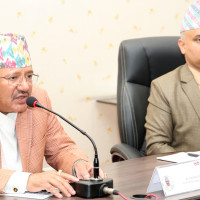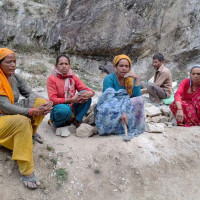- Tuesday, 17 February 2026
Reality Of Economic Diplomacy
Economic diplomacy encompasses a wide range of initiatives aimed at economic benefits for a nation leveraging international goodwill cultivated by its diplomats through years. Effective economic diplomacy plays vital role by fostering trade, attracting investment, showcasing countries' strength and building bridges of cooperation. Not all the nations in the world are in the same level of development, nor do they share identical sets of natural resources. The Gulf nations possess a reserve of huge petroleum and gas resources, South Africa is rich in precious metals and diamonds, China boasts of a massive industrial base and many South Asian countries including Nepal are endowed with fertile soil and abundance of water resources.
The essence of economic diplomacy, therefore, lies in aligning a nation's specific productive strength with the needs of friendly countries. By creating mutually beneficial cycles, countries can capitalise on their unique resources and capabilities to foster sustained economic growth and strengthen cooperation. Experience shows that some countries, despite having limited resource options, have shown remarkable efficiency in utilising them to raise the economic standard of their people.
Strategic marketing
For example, Qatar relies primarily on its gas and oil reserves which it exports to international markets. Through strategic and efficient marketing of its products, it has emerged as an economic superpower of West Asia in a short span of time. Singapore has a similar story. Endowed with minimal natural resources, this tiny island stand as a testament of strategic foresight. Benefiting from its location in a critical economic corridor, Singapore has crafted an extraordinary model of economic diplomacy. This approach has not only established itself as one of the wealthiest nations of the world but has also contributed to the economic transformation of South East Asia.
Diplomacy has many dimensions but, in essence, it is an art of subtly influencing the host country by thoughtfully navigating their cultural and intellectual spaces. This is achieved through the effective presence of envoys who are academically sound, well-informed, communicative and approachable. Ambassadors skilled in highlighting their nation's strength while identifying and exploring mutually beneficial opportunities for collaboration existing in the host countries, can play pivotal role in promoting economic diplomacy.
Unlike many other countries of South Asia, Nepal is endowed with multiple strands of economic potentials. It has a considerable area of fertile agricultural land distributed over various geographic and climatic zones making it one of the few countries in the world offering natural environment for the production of diverse cereal crops, fruits and vegetables. Foods are the commodities which are in the greatest demand in the world today. A recent UN statistics show that 307 million people will be under the threat of hunger in 2025. This underscores the critical importance of prioritiSing agricultural products as a key focus for Nepal's export trade contributing to global food requirements and enhancing its own economic growth.
In recent decades, the global food scarcity is growing at an appalling rate with agricultural productivity declining because of increasing threats of war, pandemics and climate change. For a country like Nepal, the looming global food emergency can emerge as a unique opportunity for connecting with the global food chain as a food exporting country. For that to happen, however, Nepal must first focus on investing In agricultural production with a short-term goal of becoming food sufficient country. The mid-term and long-term goal should focus on becoming grain exporting country.
To realise this vision, Nepal should identify platforms to introduce Nepali farm products to prospective suppliers of agricultural products, while facilitating transfer of technology and modern farming tools useful for increasing agricultural yields. Investment in irrigation, cold storage chain, minimising post-harvest loses could also be promoted through effective economic diplomacy. Nepal's growing tourism industry, emerging cross-border electricity trade, abundance of clean spring water, herbal resources, potential for high quality wooden furniture production may also present other key sectors with strong appeal to international investors.
Each of these sectors hold significant opportunity for growth and investment showcasing Nepal's economic potential on a global stage. Economic diplomacy involves a delicate art of negotiating the terms and tariff for fair trade, removal of barriers such as export bans and protectionism. It also covers simplification of legal procedures relating to security of investment, avoidance of double taxation and transfer of funds upon completion or termination of the contract.
However, Nepal's government's approach to economic diplomacy appears to be more as a formality than a substantial and clearly lacks result-oriented process. It is limited to mere paperwork and casual appeal to foreign investors to invest in Nepal, without any concrete groundwork supported by substantial projects with well-defined objectives to be achieved. No investors are likely to come to us offering substantial capital to invest in ventures that require building from the ground up or lack operational viability. Self-sustaining enterprises are essential for attracting foreign investment. We must, therefore, first build multiple strands of self-sustainable economic enterprises for foreign investors to enter into business transaction with Nepal.
Effective economic diplomacy also demands alignment of its focus with the priorities of financial institutions like the World Trade Organisation (WTO), World Bank, Asian Development Bank and Agriculture and Food Organisation (FAO) to connect national productive capacity with the needs emerging in other parts of the world. For example, if we gain export capacity in the field of agriculture, our economic diplomacy must align with the global effort to combat hunger. Mobilising global financial systems for subsidy and credits to entrepreneurs engaged in farm industries is equally vital.
Resilient economy
Economic diplomacy serves as a cornerstone for fostering regional and global economic partnership, driving mutual growth through collaboration. Foreign investment should not be taken as a charity received from affluent nations but a strategic means to build on national prosperity to be able to contribute towards achieving shared prosperity. Economic diplomacy should be taking as a tool which ensures a nation to create equitable development contributing to strengthen the foundation of a resilient, interconnected and sustainable global economy that benefits all.
(Dr. Bharadwaj is former ambassador and former chairperson of Gorkhapatra Corporation. bharadwajnarad@gmail.com.)














